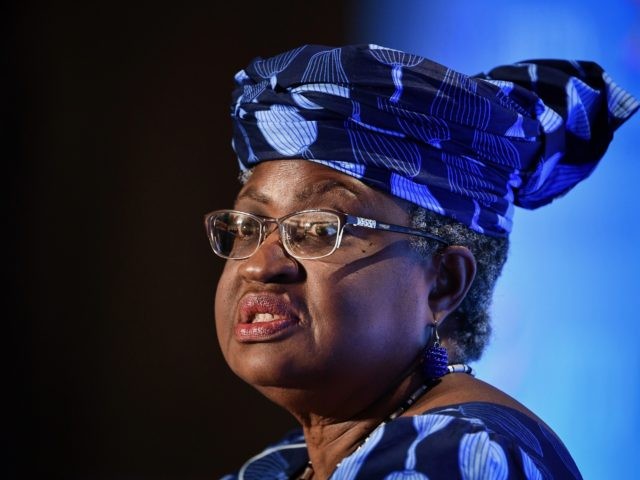The recently installed head of the World Trade Organization (WTO), Ngozi Okonjo-Iweala, said that it will be “in the interest” of the United Kingdom and other wealthy nations to donate vaccines to developing countries now rather than inoculating their own people.
Ms Okonjo-Iweala said that while the British government’s stated intention to donate surplus vaccines to poorer countries was “welcome”, she said that the government should start donating vaccines now, despite many Britons remaining unvaccinated.
“I don’t think we should wait to get surplus when other people have been served,” the WTO chief told the BBC, adding: “I think that any donations that are coming must come now.”
“The reason is very simple. It’s in the interest of rich countries as well as poor countries to have equitable access,” she claimed.
Okonjo-Iweala, who received the backing of the Biden administration as well as the Chinese Communist Party (CCP), pointed to a study from the International Chamber of Commerce (ICC) which suggested that the world would see economic damage if it fails to vaccinate poorer nations.
The study claimed that the world could lose as much as $9tn (£6.4tn) in terms of GDP by the middle of next year if only richer countries have vaccinated significant portions of their populations.
“Half of that cost will be borne by rich countries,” Okonjo-Iweala declared, going on to insist: “So we need to understand that it’s in the self-interest of both rich and poor to have equitable access to vaccines otherwise all counties lose; all people lose.”
She did not address the impact on British and other Western businesses and workers in industries such as hospitality of remaining locked down while vaccines are sent overseas, however.
On Friday, Prime Minister Boris Johnson committed to donating most of the United Kingdom’s surplus coronavirus vaccine supplies to third world nations at a virtual summit of G7 leaders.
The leaders of the world’s biggest economies, excluding China and Russia, said that they will aim to make some 1.3 billion doses of the vaccine available to poorer countries through the COVID-19 Vaccines Global Access (COVAX) scheme while committing to increase funding to the programme to $7.5bn (£5.3bn).
However, should the British government follow the urgings of Okonjo-Iweala and begin shipping out vaccines before inoculating native Britons, the country could risk losing the advantage of its successful vaccine rollout, particularly in comparison to the European Union.
The calls for Brexit Britain to sacrifice during the pandemic from international bodies is nothing new, however.
In January, a spokeswoman for the United Nations’ World Health Organization, Margaret Harris, called on the British government to suspend vaccinations after inoculating key demographics and workers in favour of shipping medicine abroad in the name of fairness in the global economy.
“We’re asking all countries in those circumstances to do that: ‘hang on, wait for those [in other countries]’,” she said, adding: “We’ll also appeal to all the people of the UK – you can wait.”
On Wednesday, United Nations Secretary-General António Guterres said that the distribution of vaccines to everyone in the world is “the biggest moral test before the global community”.
“Yet progress on vaccinations has been wildly uneven and unfair,” he alleged.
“Just ten countries have administered 75 per cent of all COVID-19 vaccines. Meanwhile, more than 130 countries have not received a single dose. Those affected by conflict and insecurity are at particular risk of being left behind,” Guterres said.
Follow Kurt Zindulka on Twitter here @KurtZindulka

COMMENTS
Please let us know if you're having issues with commenting.